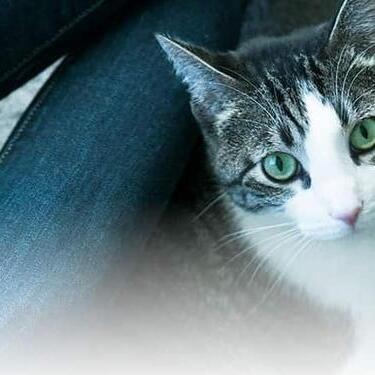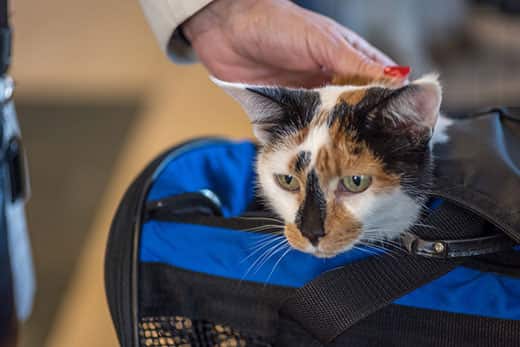
-
Find the right food for your pet
Take this quiz to see which food may be the best for your furry friend.
Find the right food for your pet
Take this quiz to see which food may be the best for your furry friend.
Featured products
 Adult 7+ Perfect Digestion Chicken, Whole Oats & Brown Rice Recipe Dog Food
Adult 7+ Perfect Digestion Chicken, Whole Oats & Brown Rice Recipe Dog FoodScience Diet's breakthrough nutrition supports ultimate digestive well-being & healthy microbiome for dogs age 7+
Shop Now Small & Mini Savory Stew with Chicken & Vegetables Dog Food
Small & Mini Savory Stew with Chicken & Vegetables Dog FoodA delicious complement to the nutrition of Science Diet Small & Mini 7+ dog food
Shop Now Adult Healthy Cuisine Roasted Chicken, Carrots & Spinach Stew Dog Food
Adult Healthy Cuisine Roasted Chicken, Carrots & Spinach Stew Dog FoodDelicious roasted chicken paired with tender vegetables in a succulent stew
Shop NowFeatured products
 Adult 7+ Tender Tuna Dinner Cat Food
Adult 7+ Tender Tuna Dinner Cat FoodWith delicious chunks in a decadent gravy
Shop Now Adult Savory Entrée Can Variety Pack Cat Food
Adult Savory Entrée Can Variety Pack Cat FoodPrecisely balanced nutrition with the delicious taste of savory minced chicken to help fuel the energy needs of cats during the prime of their life
Shop Now Adult 7+ Senior Vitality Chicken & Vegetable Stew Cat Food
Adult 7+ Senior Vitality Chicken & Vegetable Stew Cat FoodImproves Everyday Ability to Get Up & Go
Shop Now -
Dog
- Dog Tips & Articles
-
Health Category
- Weight
- Food & Environmental Sensitivities
- Urinary
- Digestive
- Joint
- Kidney
-
Life Stage
- Puppy Nutrition
- Adult Nutrition
- Senior Nutrition
Cat
- Cat Tips & Articles
-
Health Category
- Weight
- Skin & Food Sensitivities
- Urinary
- Digestive
- Kidney
-
Life Stage
- Kitten Nutrition
- Adult Nutrition
Featured articles
 Do Dogs and Cats have Belly Buttons?
Do Dogs and Cats have Belly Buttons?Learn whether cats & dogs have belly buttons like humans, what the function is, and if there are any health concerns associated with it.
Read More Why Are Dogs and Cats So Cute?
Why Are Dogs and Cats So Cute?If waggy puppy dog tails and furry kitten yawns make you swoon, you're not alone. Why are cats so cute? And, dogs too! Let's find out!
Read More Does My Pet Hate Me?
Does My Pet Hate Me?Learn tips for bonding with your pet if you've ever thought, 'My dog doesn't like me, or 'Why do I have a standoffish cat?'
Read More -


With so many options, finding the best cat carrier for your furry friend can feel overwhelming. Should it be soft-sided or hard-sided and top-loading or front-loading? And what's the best cat carrier for difficult cats?
This guide will help you make sense of the many cat carrier choices out there and choose the best one for your kitty.
Why Use a Cat Carrier?
A cat carrier should be at the top of any cat travel checklist. Even if you're just driving your kitty down the block or to the veterinarian, it's important for your cat's physical safety and emotional well-being to secure them in a carrier. And a DIY carrier — like a laundry basket, tote bag or pillowcase — won't work, emphasizes CatHealth.com. Your cat "could easily get lost or get in your way while you're driving."
The best cat carrier will protect your cat from getting injured while in the car. Carriers also provide cats a comforting, secure space when they're feeling anxious about traveling.
What to Consider When Shopping for the Best Cat Carrier
Take the following aspects into account when comparing different cat carriers.
Cost
There are cat carriers for every budget, from leather ones that cost upwards of $3,000 to ones you can buy for a moderate $20. You don't need to spend big bucks, but you also don't want to spend too little and risk putting your cat in a carrier that's not well-made.
Size
The best cat carrier for your kitty will be just the right size for them. If a carrier is too big, your cat can slide around in it, and they may feel insecure and stressed. As Cat Behavior Associates explains, a more snug carrier will give your cat a feeling of security. Just make sure it's big enough for them to turn around and lie down in.
Closures
Don't forget to compare the closures of the carriers you're considering. The easiest carriers to use have two openings — one on top and one in front. Most hard plastic carriers unlatch in the middle so you can easily lift the carrier lid up and away from the bottom portion. These are great because you don't have to coax your cat out of the carrier, and they get to stay in their comfy spot.
Try to avoid carriers with zippers and Velcro closures, as cats can break these open if they're motivated enough. A carrier with a latched front gate is your best bet; even the most clever cat shouldn't be able to open it.
Maintenance
Since you'll have to clean the carrier regularly, ideally before and right after use, look for carriers that are simple to clean. Most carriers can be easily vacuumed or washed with warm water and mild dish soap. Some carriers also have removable padding that you can throw in the laundry with pet-safe laundry detergent.
Types of Cat Carriers
Here's a rundown of the most common cat carriers you'll find, along with their pros and cons.
Cardboard Carriers
Shelters give this type of carrier to new cat parents at the time of adoption. You shouldn't use this as a regular carrier because it's not constructed for long-term use. The cardboard fibers will eventually break down, your kitty will chew on it and the sides will become less rigid. You can keep it around the house as a fun hideout for your kitty, though.
Soft-Sided Carriers
Carriers with soft shells are made with sturdy yet flexible materials such as polyester, nylon and microfiber. A soft-sided carrier is less heavy than a hard carrier. It's also pliable, making it easier to maneuver safely into tight spaces, such as under an airplane seat. This can come in handy when you need to store the carrier when it's not in use. While soft carriers are durable, your cat can easily damage the material with their claws and teeth. Soft carriers also don't provide as much protection as a hard-sided carrier.


Tasty Tips
Hard-Sided Carriers
A perennial favorite for its ease of use, a hard cat carrier is more durable than other styles. The hard shell provides a sturdy space for your cat to chill while traveling. Hard carriers typically don't come with their own padding, but you can place a towel, small blanket or even a tiny pet bed inside to make your cat more comfortable. If you do insert padding, be sure your kitty still has enough room to move around comfortably. The biggest downside to hard-sided carriers is that they are bulkier and hard to stow away when they're not in use.
Rolling Carriers
The biggest perk of a rolling pet carrier is its maneuverability. It's a great option if you can't bear heavy loads. But, you have to remember to treat a rolling carrier with extra care. "Make sure to keep it level — carry it like a fragile present, not a piece of luggage," advises Pleasant Paws Veterinary Care. "A small amount of movement on the outside can seem like a carnival ride to a scared cat inside."
Cat Strollers and Backpacks
You can also transport your pet in a cat stroller or backpack. While these carriers can be fun, keep in mind that they can also be more stressful for cats than other carriers. A stroller doesn't provide the same amount of protection as a sturdier pet carrier, and a backpack can force your cat into an uncomfortable and awkward position.
If you're using a cat carrier, the possibility of needing to transport them in a car is probably very likely. In these cases, you might look for a cat carrier that is specially designed to clip into seat belts. This will help the carrier from sliding around in the car, stressing out your cat further, helping to prevent injury if you have to make a sudden stop.
The Best Cat Carrier for Difficult Cats
Getting your cat into their carrier can be an arduous process. And if your cat is irritable by nature, it can be even more of a challenge. Your secret weapon? A towel. If your kitty won't get into their carrier, gently wrap them in a towel and place them inside yourself. You also can line the carrier with a towel and place another one on top of the carrier to make it nice and cozy. And if they won't come out of the carrier? Use the same method, but be extremely careful reaching in.
The American Association of Feline Practitioners reports that the best carrier for a difficult cat is a hard-sided carrier. You can remove and replace the top with ease and the latched front gate will keep your fur baby securely locked in.
No matter which carrier you choose, don't forget to label the carrier with your name, contact information and a photo of your cat. This label is vital in the rare chance that you and your kitty get separated. Ultimately, go with the carrier that keeps your feline friend the safest and most comfortable while in transit.


Christine O'Brien is a writer, mom, and long-time cat parent whose two Russian Blues rule the house. Her work also appears in Care.com, What to Expect, and Fit Pregnancy, where she writes about pets, pregnancy, and family life. Find and follow her on Instagram and Twitter @brovelliobrien.
Related products

Precisely balanced nutrition with the delicious taste of savory minced chicken to help fuel the energy needs of cats during the prime of their life

Improves Everyday Ability to Get Up & Go

With delicious chunks in a decadent gravy

Supports energy level and beautiful fur in mature cats
Related articles

Brushing your cat's teeth is just as important as brushing your own. Learn signs or oral health problems in your cat and how to avoid them.

Discover which cat toys games your feline friend might like, and how they are great sources of exercise. Explore our library of articles to learn more.

Discover the benefits of Hill's line of kitten foods and how they provide complete and balance nutrition for growing kittens.

Discover how to identify cat sensitive skin and what you can do to help your cat thrive from head to paw.

Put your cat on a diet without them knowing
Our low calorie formula helps you control your cat's weight. It's packed with high-quality protein for building lean muscles, and made with purposeful ingredients for a flavorful, nutritious meal. Clinically proven antioxidants, Vitamin C+E, help promote a healthy immune system.
Put your cat on a diet without them knowing
Our low calorie formula helps you control your cat's weight. It's packed with high-quality protein for building lean muscles, and made with purposeful ingredients for a flavorful, nutritious meal. Clinically proven antioxidants, Vitamin C+E, help promote a healthy immune system.


